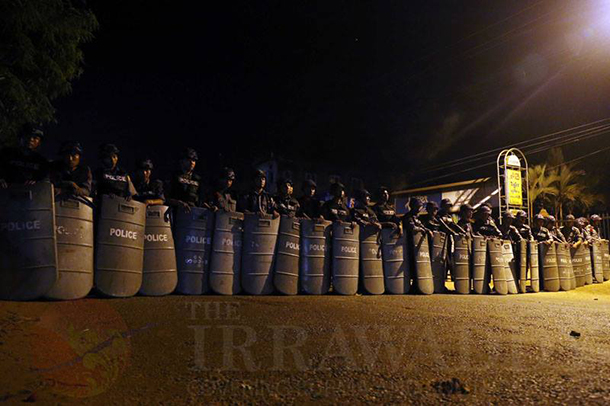Poorly Planned Census in Disarray as Calls for Postponement Grow Stronger
By Burma Partnership • April 8, 2014 Enumerators arrived in Arakan State on Sunday, 30 March in the company of three hundred armed policemen who were brought into the area in several army trucks to conduct the nationwide survey. The first national census since 1983 should be vital in planning the nation’s needs in health, education and development. However, the census has triggered violence in Arakan State, as humanitarian aid offices were raided, aid workers fled, local aid workers threatened not to assist the Rohingya, and aid to the Rohingya communities living in internally displaced camps has halted.
Enumerators arrived in Arakan State on Sunday, 30 March in the company of three hundred armed policemen who were brought into the area in several army trucks to conduct the nationwide survey. The first national census since 1983 should be vital in planning the nation’s needs in health, education and development. However, the census has triggered violence in Arakan State, as humanitarian aid offices were raided, aid workers fled, local aid workers threatened not to assist the Rohingya, and aid to the Rohingya communities living in internally displaced camps has halted.
So far three people – two under the age of five – have died as a result of the absence of medical care and food prices are soaring as water and food becomes scarce. The Burma government has rescinded their commitment to allow Rohingya’s to self-identify, folding under pressure from Arakanese Buddhists to boycott the census. The tension in Arakan State is spreading throughout Burma as an anti-Muslim riot took place in a town on the outskirts of Rangoon, where an angry Buddhist mob pelted Muslim-owned properties with stones.
While a humanitarian crisis unfolds in Arakan State, census workers fanned out across Burma to fill out a forty one point form with questions ranging from education, gender, birth rates and households’ access to water. The respondents are classified according to a list of 135 “national races,” which ethnic groups have fiercely claimed is an erroneous categorization of ethnic groups from the era of General Ne Win. A call for consultation and transparency from the United Nations Population Fund (UNFPA) and the government went unresolved as the census was launched.
As a result, the census will leave out 400,000 people in the territory controlled by the Kachin Independence Organization (KIO). The KIO, United Wa State Army (UWSA) and other ethnic groups that control large swathes of territory have boycotted the census for its flawed categorization of ethnic groups, leaving authorities to “rely on international experts and technical know-how,” according to an official from the Immigration Ministry. Those who decide to choose an ethnic category are not allowed to select more than one ethnic group, which is a most difficult conundrum for some who identify themselves as coming from more than one ethnic background. There is no “one-size-fits-all” categorization of ethnic groups, and to bar them from selecting multiple categories is in violation of their right to identity and is not in compliance with international standards.
While those who do not identify themselves as one of the “national races” would be allowed to categorize themselves as “other” and provided a write-in blank, Rohingya homes went undocumented by the team of enumerators on Sunday. Despite a statement by the UNFPA that reaffirmed commitment to conduct the census in accordance with international standards and human rights principles, the enumerators have been told by Presidential spokesman Ye Htut not to carry out or accept the ethnic categorization of Rohingya. Leaving Rohingya out of the census would imply that approximately one million of the Muslim population, out of the 3.34 million people in Arakan State, would be unaccounted for according to data collected by the Burma government in 2010.
Burma Campaign UK has called for the donors to stop all “political, technical and financial support [of the census] in order to avoid further endorsement of discriminatory policies against the Rohingya” Human Rights Watch has called for “the suspension of the census until it can be carried out safely and fairly.” Giving political support to the Burma government as the UNFPA and international donors have done thus far is to continue validating the government’s policy of denying the existence of an entire race of its population.
As the government carries on conducting the poorly planned census under criticism from the US, UK and other international and local organizations, thousands will be without sufficient drinking water by the time census concludes on 10 April, and with food supplies running out within two weeks in parts of Arakan State. The attacks in the last few weeks have not just been attacks on buildings of INGO’s but an attack on an entire humanitarian response in Arakan State and these attacks are linked with the census. With only 12 called into questioning for the attacks in Sittwe, more needs to be done to hold violent attackers accountable.
To carry on conducting a census of the people of Burma, while putting them in life threatening situations is deplorable. Now is not the time for the census, but a time to commit to national reconciliation, the rule of law, and peaceful resolution of religious differences. As Ban Ki-Moon stated to Burma recently, “impunity cannot be tolerated in the context of Myanmar’s’ reform process and the protection of all civilians.”
Tags: Arakan State, Arakan/Rakhine, Burma Partnership, Rohingya, United Nations Population Fund, ViolenceThis post is in: Blog
Related PostsU.S.: Lifting Sanctions on Myanmar Puts Human Rights Progress At Risk
Advisory Commission on Rakhine State – A Welcome Investigation into Arakan State’s Human Rights and Humanitarian Crisis
NLD Government Must Lift All Aid Restrictions in Arakan State
United States Commission on International Religious Freedom – Burma: 2016 Annual Report
(၂၉) ႏွစ္ေျမာက္ စစ္ေတြဆန္ျပႆနာေန႔ ဝမ္းနည္းေအာက္ေမ့ဖြယ္ အထိမ္းအမွတ္ သေဘာထားထုတ္ျပန္ခ်က္









 All posts
All posts